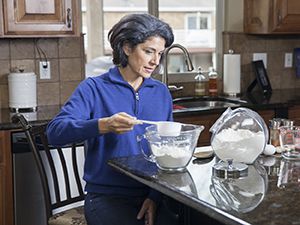Fear of shortness of breath may stop you from being as active as you once were. You don’t have to live this way. Managing your time and pacing yourself can help you conserve energy and do more. It’s even OK if you’re short of breath sometimes. You can learn to work through this without limiting your activities.
Manage your time
Shortness of breath can make everyday tasks take longer. This means there’s less time to do the things you enjoy. You can help prevent this by managing your time. Try these tips:
-
Plan ahead so your tasks are spaced throughout the day. As you plan, keep in mind the times of day you tend to have the most energy.
-
Do only one thing at a time. Finish one task before starting another.
-
Gather everything you need before you start a task. This cuts out unneeded steps while you’re working.
-
Think about what you really need to do. Be realistic about what you can get done in a day.
Balance activity and rest
When you’re tired, your activities will take longer. Fatigue also makes you more likely to get an infection. Plan your day so that your tasks are spaced throughout the day. To have more energy:
-
Stop and rest when you need to. Don’t wait until you’re overtired.
-
Switch back and forth between hard tasks and easy ones.
-
Give yourself plenty of time for each task, so you don’t have to hurry.
-
Take
20 to 30 minute rest breaks after meals and throughout the day. -
If an activity takes a lot of energy, break it into smaller parts. For instance, fold the laundry first. Then take a break before putting it away.
-
Try not to exert yourself in extreme cold or heat.
Find ways to conserve energy
Conserving your energy can help you stay active and breathe better. The way you use your body during a task can help you conserve energy. Think of ways to make things easier, and take your time to ease shortness of breath.
For some tasks, you can also use special aids designed to reduce the amount of energy needed. Here are some tips:
-
Sit whenever possible, and keep your arms close to your body. Use slow, smooth motions.
-
Sit to dress and undress, shave, brush your teeth, and comb your hair. Use a long-handled reacher to pull on socks and shoes, and long-handled items like shoe horns.
-
Sit on a bench to shower. Use warm water, not hot. (Steam can make it harder to breathe.) Dry off by wrapping yourself in a terrycloth robe.
-
Use energy-saving appliances, such as an electric can opener, a power toothbrush, and a dishwasher.
-
Use a cart with wheels to move groceries, laundry, dishes, and other items around the house. Some carts have seats so you can rest when you need to.
-
Use lightweight, nonstick pots and pans to cook. Soak dirty dishes instead of scrubbing them. Air-dry dishes, or use a dishwasher.
-
Mix, cook, serve, and store foods in the same dish.
-
Keep the things you use most at waist level, so you can get them without reaching or bending.
-
Use steps slowly, pausing at each step. If you have steps outside or in your home, think about adding ramps or stair lifts.
-
Think about ways that others can help you. You might get help from friends, family members, or home health aides.
Remember to breathe
Sometimes people with an illness or condition that affects the lungs try to rush through tasks so they won't get short of breath. This uses more energy and can actually increase shortness of breath. Instead, slow down and pace your breathing. These tips may help:
-
Move slowly during tasks that take a lot of effort, such as climbing stairs or pushing a shopping cart.
-
Use pursed-lip and diaphragmatic breathing while you go about a task.
-
Breathe out (exhale) when you exert effort. For example, breathe out as you lift up a grocery bag. Once you’re holding the bag, breathe in. Ask the checker at the supermarket to pack your grocery bags so they are light and easy to carry.
-
Focus on taking slow, deep breaths. If your breathing is shallow, you don’t take in as much air.
-
Remember that it’s OK to be short of breath. Just pace yourself and do pursed-lip breathing.
Talk with your healthcare provider
-
Ask if you should use supplemental oxygen.
-
Ask for help to stop if you smoke or use vaping devices.
-
Ask if you need a referral to occupational and physical therapy. Therapists can come to your home. They can help you with exercises and show you how to make daily activities easier.
-
Ask for a home health referral. If your breathing problems keep you from taking care of yourself, you may be able to get certain home health services. Check with your insurance plan.
Pursed-lip breathing
This type of breathing helps you exhale better. Breathing this way during activity will help you reduce shortness of breath:
-
Relax your neck and shoulder muscles. Breathe in (inhale) slowly through your nose for 2 counts or more.
-
Pucker your lips as if you are going to blow out a candle. Breathe out slowly and gently through your lips for at least twice as long as you inhaled.


